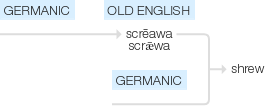Shrew
Old English scrēawa, scrǣwa, of Germanic origin; related words in Germanic languages have senses such as ‘dwarf’, ‘devil’, or ‘fox’.
wiktionary
From Middle English *schrewe, from Old English sċrēawa(“shrew”, literally “biter”), from Proto-Germanic *skrawwaz(“thin; meagre; frail”), from Proto-Indo-European *(s)ker-(“to cut; shorten; skimp”). Cognates include Old High German scrawaz(“dwarf”), Norwegian skrugg(“dwarf”).
From Middle English schrewen(“to make evil; curse”), from Middle English schrewe, schrowe, screwe(“wicked; evil; an evil person”), from Old English *scrēawa(“wicked person”, literally “biter”). Perhaps ultimately from the same word as Etymology 1 above.
etymonline
shrew (n.)
small insectivorous mammal, Old English screawa "shrew-mouse," unknown outside English, and "the absence of evidence for the word between the OE. period and the 16th c is remarkable" [OED]. Perhaps from Proto-Germanic *skraw-, from PIE *skreu- "to cut; cutting tool" (see shred (n.)), in reference to the shrew's pointed snout. Alternative Old English word for it was scirfemus, from sceorfan "to gnaw."
The meaning "peevish, malignant, clamorous, spiteful, vexatious, turbulent woman" [Johnson] is late 14c., from earlier sense of "spiteful person" (male or female), mid-13c., traditionally said to derive from some supposed malignant influence of the animal, which was once believed to have a venomous bite and was held in superstitious dread (compare beshrew). Paired with sheep from 1560s as the contrasting types of wives.
